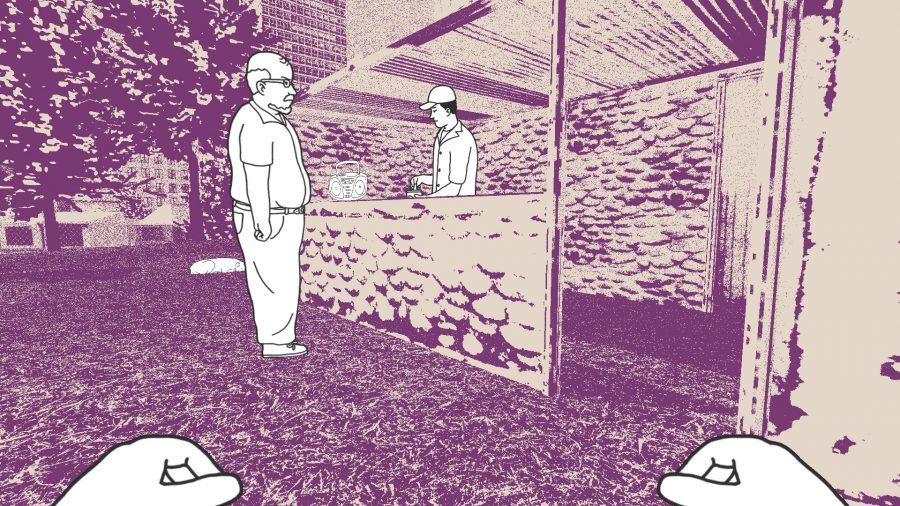“Levedad” (“lightness” in Spanish) (2018)
“Levedad” is a self-described “game about capturing time through the contemplative gaze of long-exposure photography.” Players start in a dark landscape, given nothing but basic controls to move around and a camera with which to take pictures of what they see. The player is able to control the shutter speed of the camera, allowing for different exposure lengths.
The game is dark-toned — not to be played in a well-lit room — and the longer you make the shutter, the more prominent small bits of light in the frame become. For example, the player may take a photograph of the starry sky and watch the stars change from dots to streaks of light. The ethereal background music of the game makes “Levedad” calming to play. The graphics are somewhat Minecraft-esque: blocky and simplified.
While the game is not available in a multiplayer format, there are characters that you can observe and take pictures of, so it’s not exactly a lonely game, although it is somewhat voyeuristic. The player can peer into someone’s room through a skylight and watch them go about their day as the player takes pictures of them. This breeds a contemplative feeling while playing the game. Players may upload the pictures they take to a public archive.

Characters and important objects in Cordero’s unreleased game all have a simplified, hand-drawn appearance, such as the dog in the corner and the two characters pictured above, listening to the stereo. The hands at the bottom of the image belong to the player.
“Despelote” (“unlocking” in Spanish) (coming soon)
“Despelote” is not yet fully developed or publicly available. However, there is a teaser of the game online. The game is much more action-oriented than “Levedad,” allowing the player to participate in a soccer game. However, it is not as simple as it sounds. Players may find themselves clashing with the other characters in the game, though the consequences are not yet clear since the game is still under development. In a tweet, Cordero states that “Despelote” is “a game about the social context of futbol.”
The graphics of the game are very different from the blocky and simplified “Levedad.” The soccer game appears to be set in a park within a city, with tall buildings in the background. The game looks as if it has been hand illustrated with a pencil. The lines are rough and sketchy. The visuals are grainy and there is little to no color, but nevertheless, it is aesthetically pleasing. The background track of the trailer — and perhaps of the game — is quiet and slow Spanish music, which eventually becomes louder and faster, mirroring the events of the game itself. The human forms in the game are all dark-haired and dressed in white, making them pop against the background of buildings and grass.

Characters and important in Cordero’s unreleased game, “Despelote.” All have a simplified, hand-drawn appearance, such as the two characters pictured above, listening to the stereo. The hands at the bottom of the image belong to the player. (Courtesy of Julián Cordero)
Bardo José (2019)
“Bardo José” is less of a game and more of an interactive visual experience. The game is set to different songs by Ecuadorian band Bardo José. When players first begin the game, they are placed atop a mountain in a colorful natural landscape of angular yellow and orange grass, complemented by a dark blue sky. Like in “Despelote,” the background features tall buildings, although these buildings are not shaped like New York City skyscrapers and are far more distant and removed from where the player finds themself. The graphics are more similar to those in “Levedad,” with blocky, abstract forms.
However, the music is the real star here. There are several songs to choose from, including the most popular ones off the band’s new album, “Gato” and “Agua.” The song can be changed by pressing the right and left arrows on the keyboard. The grass moves to the rhythm of the somewhat electronic Ecuadorian music. Lines and swirls in the sky, reminiscent of the long-exposure photography in “Levedad,” also accompany the music. Players may move around and obtain an aerial view by clicking their mouse, though the most hypnotic visual is the ever-changing sky and the waving vegetation.

In this game, players can experience scenic visuals, like this dark blue sky lit with bright electric streaks, accompanied by music which directly interacts with the scenes. The music is by an Ecuadorian band “Bardo José,” who the game is named after. (Courtesy of Julián Cordero)
Email Sima Doctoroff at [email protected].


























































































































































